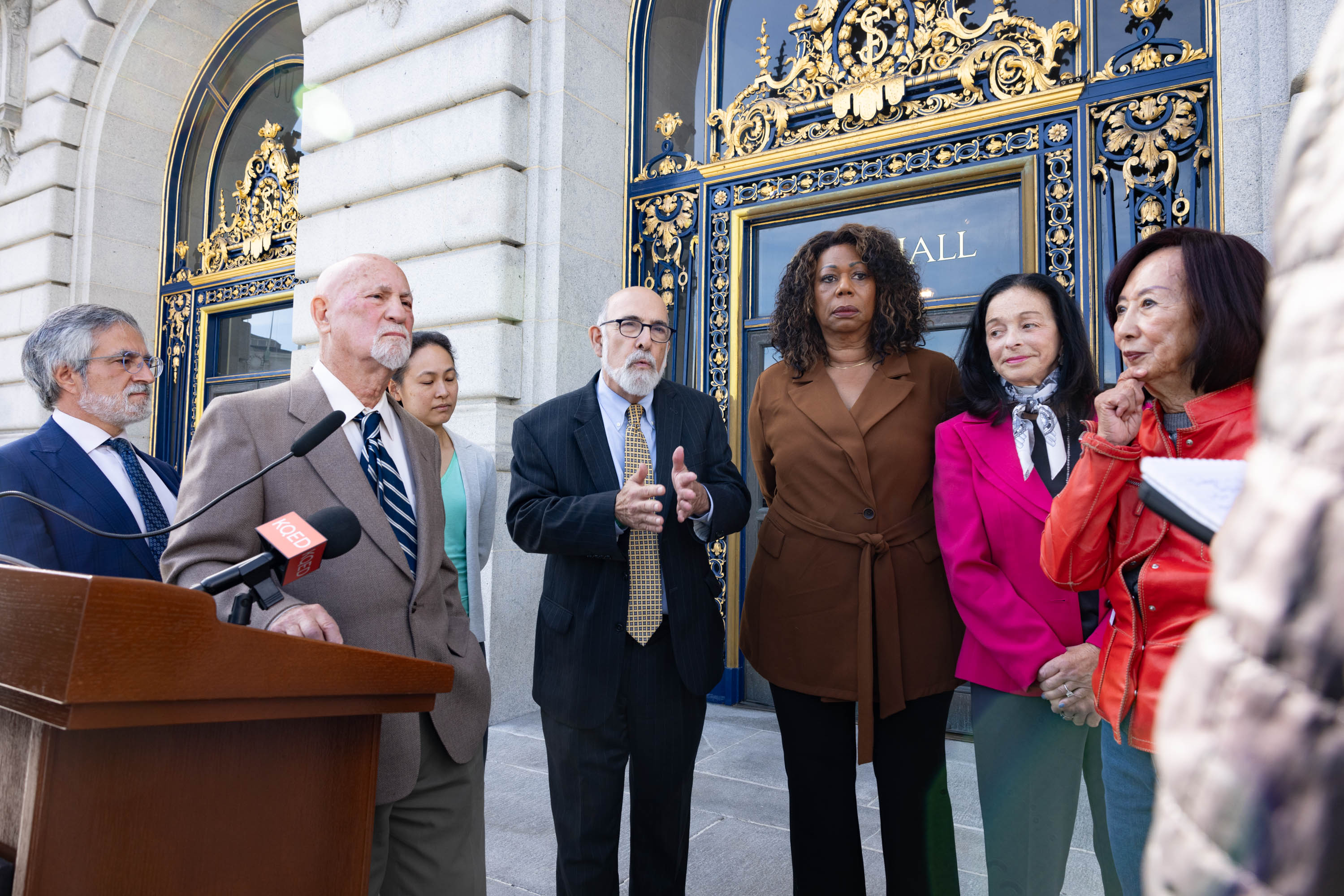Judicial elections normally don’t attract much political attention in San Francisco, but concerns over the city’s drug crisis and increased property crimes have engendered a backlash that inspired challengers to contest two local jurists in the March election.
Now, a city lawmaker, along with several senior or retired members of the San Francisco Superior Court bench, are condemning the challenges as politically motivated, “misplaced,” and “dangerous.”
San Francisco Superior Court Judge Michael Begert is facing a challenge from Albert “Chip” Zecher, a corporate lawyer and board member of UC Law San Francisco. Judge Patrick Thompson is facing a challenge from Deputy District Attorney Jean Myungjin Roland.
The challenges come amid heightened concern over crime in San Francisco and its resulting political repercussions, including the 2022 recall of reform-minded District Attorney Chesa Boudin.
San Francisco Supervisor Aaron Peskin and the jurists made their points on the matter at a Thursday morning press conference at City Hall. Others present were former presiding justice of the California First District Court of Appeal, Division Two, J. Anthony Kline; First District Court of Appeal Justice Teri Jackson; and retired Superior Court Judges Harold Kahn, Lillian Sing and Ellen Chaitin. Kelly Matayoshi from the Asian American Bar Association also attended.
“The reason we are here today is because a rare thing is happening in San Francisco where a number of incumbent judges are being challenged,” Board of Supervisors President Aaron Peskin told reporters at the press event. “This is a phenomenon that is sweeping our country. It has swept the states of Texas, Louisiana, Alabama. Thankfully, California has thus far been immune from that kind of behavior. … It is misplaced, it is dangerous and we cannot allow it to happen in San Francisco.”
Kline and the other judges argued that any challenge to a sitting judge should be over matters of integrity and competence, not politics.
“There’s a difference between a judicial election and all other elections,” Kline told reporters. “The very different role of the courts is to meet the needs of the Constitution. It is not the purpose of the courts to satisfy the political demands of the people. I hope that the Superior Court, which I believe is an extraordinarily able court, does not become a political body. You know, you can buy a judge in Texas, but you can’t buy a judge in San Francisco.”
Jackson concurred.
“We are here to apply the law that has been passed by [the legislators] many of you voted for in Sacramento and to apply that law fairly,” she said. “We are not here to get tough on crime. We’re not here to be liberal on crime. We are here to apply the law so that everyone who comes in our courts have a fair trial.”
Peskin also placed the current judicial contests in the context of another challenge to multiple seats on the San Francisco Superior Court bench from the left in 2018.
Deputy Public Defenders Niki Solis, Kwixuan Maloof, Phoenix Streets and Maria Evangelista ran against incumbent Judges Jeffery Ross, Cynthia Ming-mei Lee, Andrew Cheng and Curtis Karnow. Peskin, along with many other members of San Francisco’s political establishment, supported the incumbents, all of whom were reelected.
San Francisco is no stranger to judicial election challenges, and several such races punctuated the 1990s. In 1990, Judge Donna Hitchens was elected to the bench in this city after defeating a conservative incumbent, Jerome Benson. In doing so, she became the nation’s first out lesbian judge. Benson was later reappointed to another post by Republican Gov. Pete Wilson.
Since then, San Francisco has seen several contested judicial elections, including when Chaitin’s husband, defense lawyer V. Roy Lefcourt, ran against incumbent Wallace Douglass in 1998. When asked about his run, Lefcourt, who was present in the audience at Thursday’s press conference, told The Standard his run was “over Douglass’ competence, not his politics.”
Douglass, first appointed to the bench by Republican Gov. George Deukmejian, defeated Lefcourt’s challenge and later retired from the bench. One person who did successfully challenge a sitting judge was former San Francisco Supervisor Gerardo Sandoval, who defeated incumbent Judge Thomas Mellon in 2008.
Meanwhile, the political group Stop Crime Action released a statement in reaction to the press conference accusing Begert and Thompson of having “a catch-and-release philosophy regarding serious criminal conduct,” noting cases where the judges released defendants with multiple arrests, adding, “Stop Crime Action firmly believes that incumbent judges should not be shielded from electoral challenges. Upholding the State Constitution and ensuring judicial accountability through elections is fundamental in safeguarding the principles of our justice system.”
Both Begert and Thompson were named in a series of posters anonymously circulated around the city in early September, alleging they released drug dealers.
Zecher also released a statement reacting to Peskin’s press conference.
“My experience and qualifications to serve San Francisco as one of their judges speaks for itself,” he wrote. “It is unfortunate that an elected official would jump to assumptions about who I am and how I would rule without knowing or ever having a conversation with me. I am focused on doing what will be in my control to bring much needed change and accountability to our judicial system, and improve public safety.”
Peskin is also introducing legislation on the issue. Though the details of the bill have yet to be announced, it could be voted on by the Board of Supervisors in the coming weeks.
